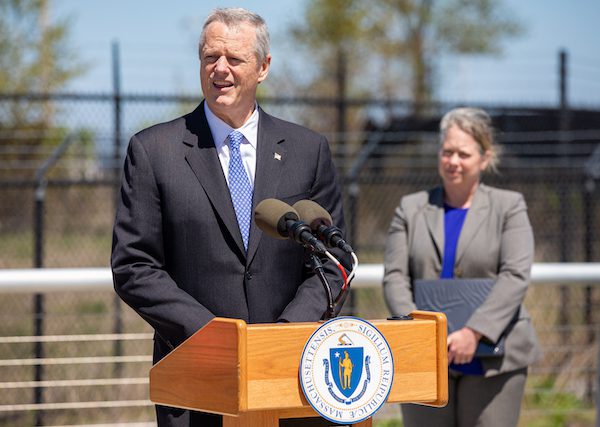Who is a member?
Our members are the local governments of Massachusetts and their elected and appointed leadership.

On May 18 in Salem, Gov. Charlie Baker announces the filing of a $1.7 billion supplemental budget bill for fiscal 2022. Also pictured is Energy and Environmental Affairs Secretary Beth Card. (Photo courtesy Joshua Qualls/Governor’s Press Office)
The Baker-Polito administration announced yesterday that it is filing a $1.7 billion fiscal 2022 supplemental budget that proposes investments in transportation, housing, environmental infrastructure, economic development, child care and education initiatives.
The administration said the legislation is supported by state tax revenues that exceed fiscal 2022 benchmarks through April by $4.2 billion (14%). The surplus also prompted the administration yesterday to formally upgrade the fiscal 2022 tax benchmarks, to $37.67 billion.
“Unprecedented fiscal year 2022 revenues afford us this opportunity to make targeted investments in some of the Commonwealth’s most pressing areas of need,” Gov. Charlie Baker said at a press event in Salem.
Lt. Gov. Karyn Polito said the bill’s initiatives “will benefit residents and communities across the state, with a focus on expanding opportunities for disadvantaged populations.” She said the bill would “increase the availability and quality of housing, build business opportunities in underserved communities, support transportation and environmental projects, and strengthen education and child care systems.”
The legislation includes $235 million for transportation projects, $200 million for Cape Cod water and sewer initiatives, and $100 million for offshore wind port infrastructure in Salem, New Bedford and Somerset.
The administration said the bill also builds in funds for the implementation of more than $9.5 billion provided through the federal Bipartisan Infrastructure Law over the next five years, as well as funding that will allow Massachusetts to access additional federal funding through matching grants. These funds complement investments proposed in the governor’s pending MassTRAC infrastructure bond bill and its recently announced FY23-27 Capital Investment Plan.
Building on the governor’s recently filed $3.5 billion economic development package, called FORWARD, the supplemental budget bill would provide $200 million for workforce housing, $100 million for public housing redevelopment in Boston, Cambridge, Salem and Worcester, and $10 million to increase permanent supportive housing for individuals and families experiencing chronic homelessness.
Another $180 million is allocated to targeted economic development initiatives, including $80 million to support efforts to improve small businesses’ options for purchasing commercial real estate, $50 million to provide financial assistance to socially and economically disadvantaged developers, particularly those owned by women and people of color, who are seeking to undertake large housing construction projects, and $50 million to “de-risk” lending to small business owners in underserved markets where access to capital is otherwise limited.
The bill also includes $150 million for higher education campus infrastructure, primarily at the Mass College of Art and UMass Dartmouth; $45 million for a new family child care home ownership and improvement program and $10 million for innovative and flexible models of child care delivery; $55 million for nursing pathways programs; and $30 million for schools and colleges to modernize science and biotechnology labs.
Administration and Finance Secretary Michael Heffernan said “unprecedented” fiscal 2022 state tax collections “will allow the Commonwealth to continue building our stabilization fund balance while making the critical investments proposed in this supplemental budget to fund infrastructure and spur economic development.”
The legislation includes several policy proposals, including a number that seek to modernize and streamline certain municipal finance rules.